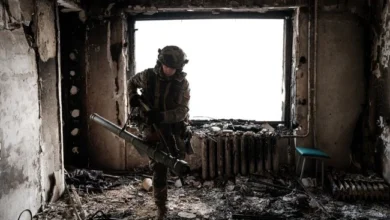Israel solves the “mystery” surrounding the sexual assault on October 7
There are more reports of sexual assault in Israel than there were after the deadly Hamas attack more than ten weeks ago.

However, determining its scope is challenging because to the dearth of forensic evidence and the unavailability of victim accounts.
Early in December, Israeli ambassador to the UN Gilad Erdan said, “Hamas used rape and sexual violence as weapons of war,” accusing foreign organizations of failing to adequately respond to Israel.
Authorities have said again in the last several weeks that the terrorists who came across from the Gaza Strip on October 7 were involved in savage gang rapes, genital mutilations, and sex acts with both dead bodies and children.
A complete image of the murders or their methodical character, according to witnesses and specialists AFP spoke with, remained to be determined after the pandemonium of the massive assault, which claimed the lives of around 1,140 people in Israel, according to an AFP count based on official Israeli numbers.
The Shura military outpost in central Israel received hundreds of victims in the days after October 7. Some of the corpses were so badly burned and deformed that careful effort was needed to examine them.
There have been no forensic complaints of sexual assault, according to police spokesperson Mirit Ben Mayor. Hamas has denied the allegations, claiming they were made in an effort to “demonize” the organization.
Before receiving the prompt burial that Judaism customarily demands, “the bodies were not checked for rape; they were checked for identification,” the speaker said.
One of the reservists entrusted with identifying and cleaning the female troops’ remains after the incident was interviewed by AFP.
“We were in such a state of shock,” said Shari, who has asked for his full name to be concealed from the press.
“A large number of young ladies showed there wearing just their panties, frequently covered in bloody rags.
“Our team commander saw several soldiers who were shot on the crotch, intimate parts, vagina or shot in the breasts,” she said.
“It is very difficult to give you exact numbers,” Shari said. She said that, despite her profession as an architect, she was not prepared to handle crimes of this magnitude.
erratic
The most deadly in Israel’s seventy-five-year history was the Hamas assault.
The health ministry of the Hamas-run enclave in Gaza reports that at least 20,057 Palestinians have died as a result of Israel’s ceaseless retaliatory shelling and ground invasion.
The identification of sexual violence in Hamas’s assault, according to Dvora Bauman, a gynecologist in Jerusalem who specializes in aiding victims of sexual abuse, was made too late.
The majority of rescuers, who were often men of Orthodox faith, “didn’t think of rape at all” while acting quickly to contain the situation, she said.
“There was a tremendous amount of miscommunication” at the time, according to 56-year-old Eli Hazen, a volunteer with the Zaka organization, which retrieves and names corpses in line with Jewish custom.
He said that “between different aspects of the rescue mission, the army, and the police” there was a lack of coordination.
“It’s hard to say exactly what happened in every particular square centimeter.”
He reported discovering the corpse of a lady shot in the back of the head in Kibbutz Beeri, nude from the waist down, even though he said that “we obviously didn’t see anything before or during” the events.
According to Hazen, her body was in an apparent state of abuse, as she was kneeling at the foot of a bed.
He told AFP that in another destroyed home inside the same kibbutz, a young woman’s body lay atop a militant’s corpse; none of them was properly clothed.
It is quite difficult to be certain about what occurred since the corpses were in poor condition and had started to rot, according to Hazen.
Simcha Greeneman, another Zaka volunteer, said that he had found a deceased lady in one kibbutz who had sharp items, including nails, in her vagina.
It was an obvious case of sexual assault, according to French legal expert Celine Bardet, creator of the non-governmental organization We Are not Weapons of War, which fights against sexual violence in war.
She also mentioned Shani Louk’s treatment, a young German-Israeli lady who was slain by the terrorists after being arrested.
Social media posts and videos revealed her naked, bruised and spat upon body in the back of a pickup vehicle.
“Discard your clothing.”
The issue is more complicated in rape situations. Exhumation is forbidden in Judaism, but experts believed it was improbable because the victims had been slaughtered.
The number of eyewitness reports in the media is growing, particularly from those who survived the Supernova music festival, which took place in the desert close to the Gaza border and drew around 3,000 attendees.
The day after the incident, Rami Shmuel, one of the event organizers, went back to the location.
Three young ladies, “naked from the waist down, legs spread,” were what he reported seeing.
He said, “One had the face burned.” While the last victim had been “shot all over the lower part of her body,” the other had been “shot in the face.”
Israeli officials estimate that the celebration claimed the lives of over 360 individuals.
While Shmuel discovered several bodies, he claimed not to have ever seen “a naked man, a man whose legs were spread”.
Accompanying condemnations of “mass femicide” on social media comes a deluge of photographs.
Along with papers purportedly discovered on the corpses of Hamas members, the Israeli army has released a phrasebook that explains how to express “take off your clothes” and “take off your trousers” in Hebrew.
They are heard discussing directives issued to rape women in at least two unsourced recordings depicting the interrogations of suspected Hamas militants.
When AFP contacted Shin Bet, the Israeli security agency, the army, and the police claimed that these films had not been made public.
“Item by item”
Currently “we can’t establish the scale or the precise details of the abuses, the modus operandi, or how many people were involved,” Bardet said.
She expressed her disappointment with the Israeli government’ “lack of cooperation,” citing their rejection of an impartial international probe among their other actions.
When AFP contacted Israeli ambassadors, they denounced the UN Human Rights Council’s commission of a probe as “biased” and said that its members were “anti-Israel” and “anti-Semitic”.
The International Criminal Court may choose to look into sexual assault; its lead prosecutor, Karim Khan, has been to the area since the start of the conflict.
But according to legal professor Cochav Elkayam-Levy, who led an investigative committee on gender-based and child abuse during the Hamas assaults, this will probably take years.
She emphasized that it sometimes takes years for women who have experienced sexual abuse to come forward.
“We’ll never understand the fate of the ladies. The whole scope of the crime is unknown to us,” she said. The jigsaw we are now assembling, piece by piece, is a damaged one.







